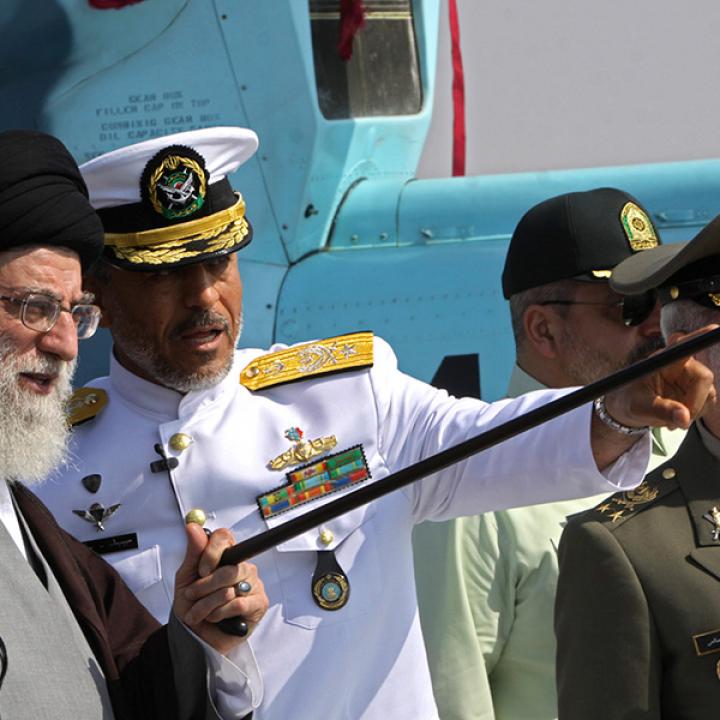
- Policy Analysis
- Articles & Op-Eds
Not So Fast: Big Questions on Iran Are Still Unanswered

If the Obama administration sees the nuclear agreement as a strategic win capable of transforming Tehran's hostility, then America's ability to deter and contain Iranian challenges will be eroded.
The successful implementation of the Iran nuclear deal is important, defusing a dangerous crisis between Iran and the international community, pushing back Iran's timeline to nuclear breakout and demonstrating America's skill deploying a sophisticated diplomatic, military, economic and intelligence operation. It also established communications with the Iranian government, which was useful in quickly defusing crises such as the release of American prisoners and detained Navy sailors.
However, while the nuclear agreement is useful, diplomatic communications are useful and the return of the prisoners and sailors is to be celebrated, there are limits to what can be read into these actions. Iran did us no favors with the agreement. It ends sanctions on Iran and will return up to $100 billion of past oil sales revenue in exchange for limits on (but no end to) Iranian enrichment and no admission of wrongdoing despite abundant evidence.
Even under the inexorable Ahmadinejad, Iran returned British sailors within 17 days without the lure of $100 billion and sanctions relief. In contrast, the Americans held by Iran on palpably trumped-up charges were exchanged for Iranians who had actually broken American laws. Iran refuses even to clarify what happened to former FBI agent Robert Levinson on its territory, and it released U.S. sailors last week only after their humiliation at Iranian hands was deliberately broadcast around the region.
But to the extent these successes are real, they are, in the end, tactical and not strategic, and in themselves will not calm the ever-more violent and dysfunctional Middle East. The reason for this is that Iran's quest for regional hegemony through asymmetrical warfare, terror and intimidation is a major accelerant to the region's problems. If the Obama administration sees the nuclear agreement as a strategic win capable of transforming Iran's hostility, then America's ability to deter and contain Iran's challenges will be eroded.
Much thus depends on how the administration perceives it. Vice President Joe Biden, speaking at The Washington Institute in April, argued that the nuclear agreement was analogous to arms-control agreements with the Soviet Union during the Cold War -- that is, useful and stabilizing, but not strategic game changers in the confrontation with Soviet ideology and aggression. If Biden was accurate, and the administration sees the nuclear deal simply as solving a specific situation, thereby freeing the U.S. to more effectively support regional security, then the Obama administration is on the right track.
But there are other indications that the administration sees the agreement as the harbinger of a different Iran, analogous to the Soviet Union when Gorbachev became party chairman. The president's remarks to Thomas Friedman on April 5 about the possibility that "Iran may change" are one of many indications that he is thinking this way. But there is little evidence that the hardcore leadership around Supreme Leader Khamenei is interested in a rapprochement -- rather the opposite, as Iran's recent ballistic missile tests, humiliation of seized American sailors and behavior in Syria all demonstrate.
Certainly our regional partners don't see Iran changing anytime soon. The president spoke in the State of the Union address about how other states call Washington when they're in crises. True, but these days they are not always happy with the answer. This is why Riyadh, Tel Aviv and Ankara, America's strongest allies in the region, are increasingly going off on their own to contain Iran and its new ally, Russia, often in inherently dangerous ways without American leadership.
If the administration opts not to counter Iran, either to encourage an unlikely transformation allegedly flowing from the agreement or to "save" the agreement and its legacy, then it will diminish, rather than enhance, stability in a vital but dangerous region.
James Jeffrey is the Philip Solondz Distinguished Fellow at The Washington Institute.
U.S. News & World Report



